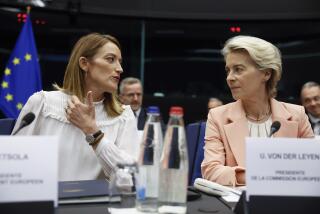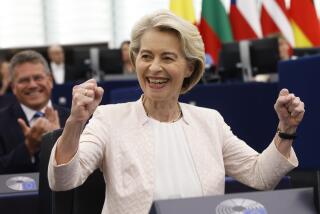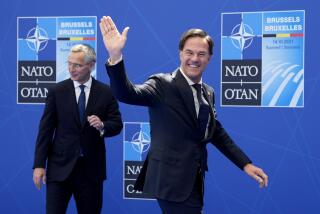Dutchman Tapped to Head EU Bank Will Fly for 4 Years
- Share via
BRUSSELS — Europe’s Alan Greenspan will be a Dutchman--but for four years only. Then, if the game plan holds, he’ll become French.
After late-night horse-trading Saturday to fill what promises to be one of the world’s most influential jobs in economics and finance, the presidency of the new European Central Bank, the favored--and, at one time, only--candidate, Willem Frederik “Wim” Duisenberg, 62, got only half the job.
An avid golfer and reputed bon vivant, Duisenberg--the former chief of the Netherlands’ state bank, who stands out at group meetings of the world’s central bankers because of his unruly mane of snowy hair--had always said he would serve the eight-year term to its conclusion if named.
But with the emotion-fraught discord over the leadership of the bank holding up formal approval of a common currency, the Dutch banker reportedly agreed to compromise.
Sometime in the first half of 2002, if the deal struck Saturday night works as planned, Duisenberg will bow out and be replaced by the other candidate, an urbane French civil servant seven years his junior, Jean-Claude Trichet, the first governor of the Banque de France since it was freed from government control in 1993.
Ironically, Trichet, whose candidacy was pushed by French President Jacques Chirac with a single-mindedness and ardor that irked some other Europeans, was denounced by that same neo-Gaullist politician when Chirac was running for the French presidency three years ago because of his opposition to widespread wage increases as inflation-fueling.
The Saturday night wheeling and dealing in Brussels could come back to haunt some of those who engaged in it.
Chirac’s obstinacy about winning a plum job for France went down poorly with some other Europeans. Curtailing Duisenberg’s term may also have nasty political costs for German Chancellor Helmut Kohl, the 16-year incumbent and the prime mover in European integration, who is running for reelection Sept. 27 but trailing badly in the polls.
Taking one after the other the helm of a new institution that in many respects is Western Europe’s answer to the U.S. Federal Reserve, Duisenberg and Trichet will become successively among the most powerful people in Europe--and, in economic terms, perhaps the most powerful.
The central bank, situated in Frankfurt, Germany’s banking and business hub, is to begin operations in July. It is the only institution empowered to authorize the printing and minting of the new money, called the euro, and Duisenberg’s and then Trichet’s signature will grace the bills.
The European Central Bank, or ECB, is also supposed to hold and manage the reserves of the euro zone countries. But its main function is supposed to be managing interest rates to keep prices stable.
For both German and French officials, that means holding inflation to 2% annually, as measured by consumer prices.
Duisenberg, who has been lionized by influential Germans like Finance Minister Theo Waigel and Bundesbank President Hans Tietmeyer for keeping a close grip on money supply, was once a free-spending Keynesian.
A member of his country’s Labor Party, he landed a job at age 30 with the International Monetary Fund in Washington. From 1973 to 1977, when the Netherlands was hit by the oil crisis, he was finance minister. The government kept spending to keep the economy growing. Inflation hit levels never before known.
Sadder but wiser, Duisenberg became a convert to fiscal prudence, irking some people in his own left-of-center party.
In 1982, he began a 15-year tenure at the Dutch central bank and became popular in the Netherlands for hitching the Dutch currency, the guilder, to the mighty German mark.
Duisenberg, who currently serves as a governor of the International Monetary Fund, has been unbending about the need for total independence for the ECB. But he was able to show flexibility in allowing some countries to fudge their economic and fiscal records to qualify for membership in the euro zone.
No one in the corridors of power in Brussels appears to doubt that Trichet is equally qualified to serve as Europe’s No. 1 banker.
A graduate of the elite Ecole Nationale d’Administration, he is an associate of former center-right President Valery Giscard d’Estaing who has served both rightist and leftist governments in Paris with distinction.
European leaders on Saturday also named a vice president of the ECB, Christian Noyer of France, whose four-year term should run out about the time Trichet arrives to take up the reins.
More to Read
Sign up for Essential California
The most important California stories and recommendations in your inbox every morning.
You may occasionally receive promotional content from the Los Angeles Times.













